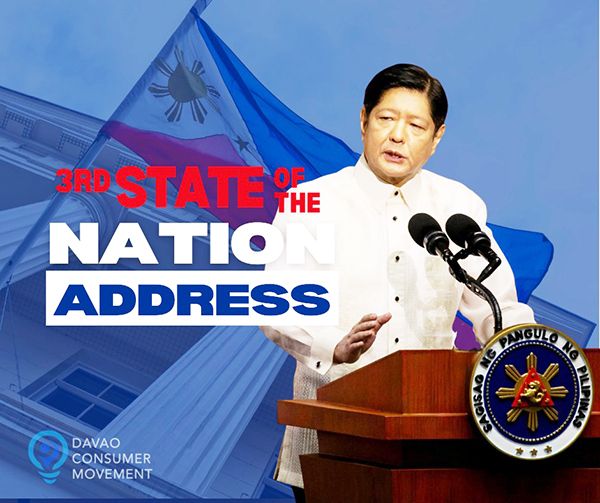Davao consumer group says PBBM SONA short on anything actionable
DAVAO CITY – President Ferdinand R. Marcos Jr.’s third State-of-the-Nation Address (SONA) was “long rhetoric but short on anything actionable” and failed to offer concrete solutions to the issues affecting the daily lives of the Filipinos, the Davao Consumer Movement said on Tuesday, July 23.

Ryan Amper, Davao Consumer Movement convenor, said that the group was expecting to hear concrete solutions, particularly how his administration intends to address rising cost of rice and other basic commodities.
“What we got were generalities that offered no concrete solutions – not even an acknowledgement that the government would continue to work for the President’s campaign promise of P20 per kilo price of rice,” he added.
The group gave the President’s SONA a rating of five out of 10.
Marcos spoke for almost an hour and a half before a crowd of 2,000, composed of congressmen, senators, officials, members of the diplomatic corps, and other dignitaries during a joint session at the Batasang Pambansa in Quezon City.
During his address, Marcos acknowledged the problem of rising cost of basic commodities, particularly the staple rice.
According to him, illegal price manipulations by hoarders and smuggling forced the government to implement temporary mandated price ceilings on rice and extend the reduced tariff rates to facilitate the importation of basic commodities, including rice, corn, and pork until the end of this year.
But he assured that these are only temporary solutions to address the problem of rising cost of basic commodities and vowed that his administration would prioritize the local production of rice despite importation of the staple crop to stabilize supply.
“We also find the points on power as lacking in clarity. It leaned more towards infrastructure, particularly interconnection and power generation, and while these are welcome, the pressing issue of the unreliability of a number of electric cooperatives in the country was not addressed,” Amper said.
Amper added that the President did not discuss how the government intends to help customers of the Northern Davao Electric Cooperative.
He said costumers within the franchise area of the electric cooperative continue to suffer from “poor power services and high power rates for a very long time.”
“There seems to be a disconnect between what the President knows or has been fed and what the true power situation is in many parts of the country. It is the same situation with Department of Energy Undersecretary Rowena L. Guevara who seems to think there is ample power in the Island Garden City of Samal despite the frequent blackouts in the area,” he said.
Amper said his group looks forward to the review of the Electric Power Industry Reform Act (EPIRA) of 2001 as they believe that there is a need to amend the law “to keep up with the times and make it more relevant in the years to come.”
“We hope our lawmakers will take into consideration the need to review the laws and regulations governing electric cooperatives. One that would put emphasis on the needs of the consumers and not the needs of some electric cooperatives' need to stay in power,” he said.
Marcos said that his administration has started reviewing EPIRA for possible amendments.
“Binabalikan at binubusisi nating muli ang EPIRA upang malaman kung angkop pa ba ito sa ating kasalukuyang sitwasyon, o napapanahon na, na ito ay amyendahan (We are going back and re-examining EPIRA to see if it is still appropriate for our current situation, or if it is time for it to be amended),” he said.